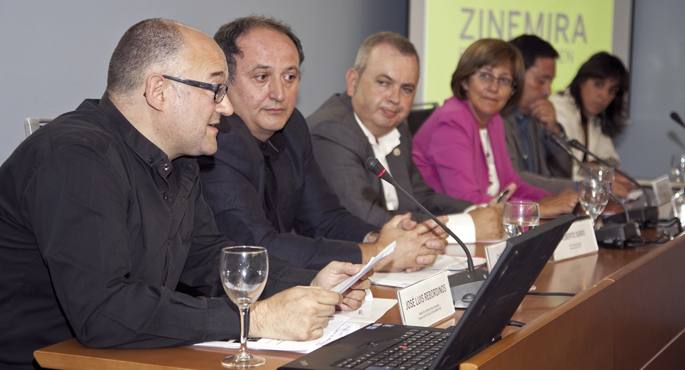
- The Zinemira section of the San Sebastian Film Festival has acknowledged the controversy in its fourth edition: The documentary The windows to look inside over five Basque prisoners has been left out of the section dedicated to Basque production. On the other hand, the following has happened without leaving its place: in the section of premieres there will be a single film in Basque.

“Basque cinema will now be more important within the Festival, like any other cinematography,” said Mikel Olaziregi, director of the festival, at the Zinemira section presentation press conference in 2009. It was a step forward. Another one. In the last edition, in 2008, the films shot in Euskal Herria stabbed the red carpet in a single day and this was the first time that Basque production was included in the official program of Zinemaldia, after ten years of Parallel Day of the Basque Cinema. How can we not see with good eyes, therefore, have a section of our own.
Three editions and four years have passed since that announcement, and the 2012 Zinemira has had in its media environment more than in previous editions, even before its beginning. Not because the Basque films have attracted media attention in themselves, but because the documentary Windows to look inside over five Basque prisoners has been left out of the section.
The issue comes from the back: at the end of June the Spanish Ministry of the Interior threatened to outlaw Bildu, as the film was co-financed by the City Hall of Donostia-San Sebastian governing that party. Carlos Urquijo artillero, the delegation of the Spanish Government to the CAV, has participated in two private passes at the Victoria Eugenia Theatre and in the attempt to prevent them. Production company Zinez has reported that at the time we are writing these lines the National Audience has asked for a copy of the film.
So things, José Luis Rebordinos’ explanations about the lack of windows to look inside when presenting the Film this year – “The Festival sees 1,800 films, there are many that are not selected and I want to make it clear that the festival has not suffered any pressure” – are not very credible, especially considering that no journalist asked for the reason of that absence. The pressures do not have to be right, the media environment that has been created against the film is enough. And also, excusatio non petita…
Unique premiere in Basque
That controversial chapter would pass – hopefully there will be no more absurdities – but it should serve to enhance Zinemira’s trajectory so far, and also to think about its role in Basque film. Besides missing one or more specific films – not a single piece of Jon Maia’s Cheese has been included – this year the section dedicated to Basque cinema will be more Castilian than ever. The only work in Basque that will be projected in the section of premieres of the section Leku Hutsak, hitz betelu of Joxeanjel Arbelaitz.
No film festival makes a selection with exclusively linguistic criteria, the main criterion should be artistic value. But in this case it hasn't been like this: Things much worse than the windows to look inwards -- it's an intentionally chosen word -- we've seen them in this and other departments. And, moreover, nobody will find it logical to offer a section to the Basque film and then discard the productions in Euskera.
Perhaps the Zinemira has had the problem since its birth. Let's go back to the article's home press conference, where he sat next to Mikel Olaziregi to remember Blanca Urgell's statements. The Basque Government Minister for Culture said that the word “Basque” should be understood “in the broadest sense”. In other words, they would prioritize geographical criteria and not language. No minimum quota was set for works in Euskera, which may lead to imbalances such as this year.
Subtitles of 24 films on the Internet
The deficit is not only seen in Zinemira; the fact that there are more movies in Basque will not fix everything; the international cinema also wants to be in its own language, but most of the subtitles of foreign films that go through other sections have been found for years only in Spanish and English. In this sense, the San Sebastian Film Festival is taking steps, albeit slowly. This year, 24 films with texts in Basque will be screened at the foot of the screen.
This is an important initiative, as these subtitles are not only to be seen in the Zinemaldia. Through the web Filmazpit www.filmazpit.eu, which the Basque Government launched last year, subtitles can be downloaded from the three Donostia-San Sebastián film festivals (Zinemaldia, Festival de Cine de Derechos Humanos y Semana de Cine de Terror), as well as from Animabasauri, Zinebi and Mendi Zinema. The films and series have been offered in SRT format, easy to use and share, with anyone who has downloaded through the P2P.
Thanks to the Internet, more and more viewers are able to watch movies in original version with subtitles. However, on many occasions there are no subtitles in Basque and only the community of speakers has been concerned with creating and distributing them – currently, most of the subtitles in Basque are created by Luistxo Fernández on its own initiative Azpitituluak.com.
As this public trend is consolidating – if it is no longer a little stabilised – in addition to individual efforts, public institutions will have something to say, but above all something to do.